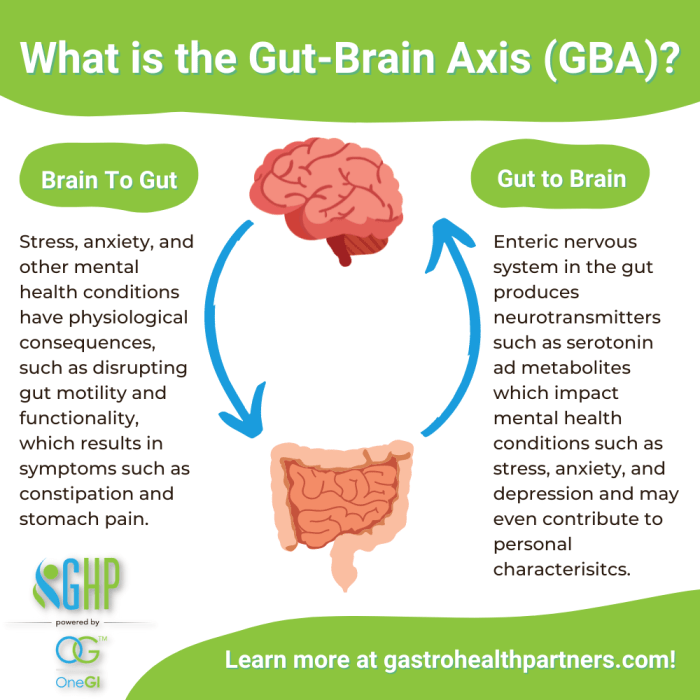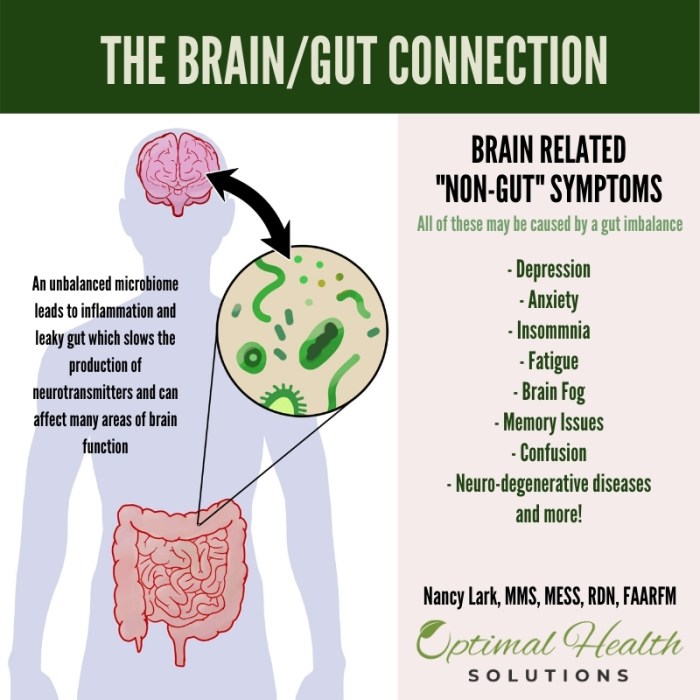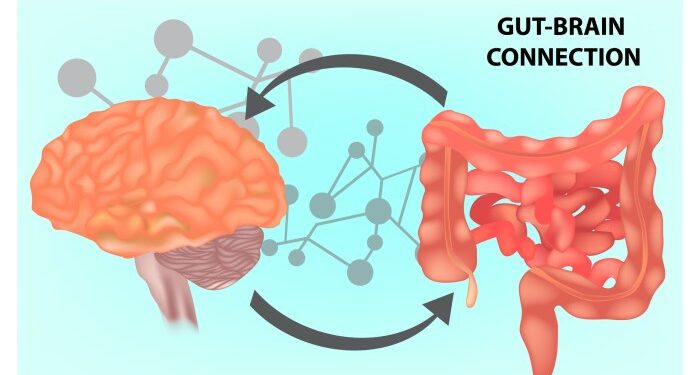Dive into the fascinating realm of gut health and its intricate connection to brain function. As we unravel the mysteries of this relationship, a new understanding emerges, shedding light on the profound impact our gut health has on cognitive processes and mental well-being.
Delve deeper into the correlation between our gut and brain, exploring how these two seemingly distinct systems communicate and influence each other in surprising ways.
Gut Health Overview

Having a healthy gut is essential for overall well-being as it plays a crucial role in various bodily functions, including digestion, immune system regulation, and nutrient absorption.
Key components of a healthy gut include a diverse range of beneficial gut bacteria, a well-functioning intestinal barrier, and a balanced immune response.
Role of Gut Microbiota
The gut microbiota, which consists of trillions of microorganisms, including bacteria, fungi, and viruses, plays a significant role in maintaining gut health. These microorganisms help in digesting food, producing essential nutrients, and regulating the immune system.
Imbalance in gut microbiota, known as dysbiosis, can lead to various health issues, including digestive disorders, autoimmune diseases, and mental health conditions.
Gut-Brain Axis
The gut-brain axis refers to the bidirectional communication system that exists between the gastrointestinal tract and the brain. This connection plays a crucial role in influencing various aspects of our health, including mood, behavior, and cognitive functions.
Gut-Brain Communication
The gut communicates with the brain through several pathways, including the nervous system, the immune system, and the endocrine system. The vagus nerve, which runs from the brainstem to the abdomen, plays a significant role in transmitting signals between the gut and the brain.
- The enteric nervous system, often referred to as the "second brain," can operate autonomously and send signals to the central nervous system.
- Gut bacteria produce neurotransmitters like serotonin and dopamine, which can affect mood and behavior.
- Inflammation in the gut can trigger a response in the brain, leading to symptoms of depression or anxiety.
Impact of Gut Health on Mental Health

Maintaining good gut health is not only crucial for physical well-being but also plays a significant role in mental health. The connection between the gut and the brain, known as the gut-brain axis, influences various aspects of mental well-being.
Effect on Mood and Cognitive Function
Poor gut health can lead to imbalances in the gut microbiome, causing inflammation and affecting the production of neurotransmitters like serotonin and dopamine. These neurotransmitters play a vital role in regulating mood and cognitive function
Link to Mental Health Disorders
Studies have found a strong correlation between gut health and mental health disorders such as anxiety, depression, and even neurodevelopmental conditions like autism spectrum disorder. Imbalances in gut bacteria have been associated with increased risk of developing these mental health issues.
By improving gut health through diet, probiotics, and lifestyle changes, individuals may experience improvements in their mental well-being.
Factors Affecting Gut Health
Maintaining a healthy gut is crucial for overall well-being, and several factors can influence the health of our gut microbiome. Let's explore some key factors that can impact gut health.
Dietary Factors Impacting Gut Health
Our diet plays a significant role in shaping the composition of our gut microbiota. Consuming a diverse range of fruits, vegetables, whole grains, and probiotic-rich foods can promote a healthy balance of gut bacteria. On the other hand, diets high in processed foods, sugar, and unhealthy fats can disrupt this balance and lead to gut dysbiosis.
The Role of Stress in Gut Health
Stress can have a profound impact on gut health through the gut-brain axis. When we experience stress, our body releases hormones that can affect the composition of our gut microbiota. Chronic stress can weaken the intestinal barrier, leading to increased inflammation and a higher risk of digestive issues.
Tips for Maintaining a Healthy Gut
- Include plenty of fiber-rich foods in your diet to support a healthy gut microbiome.
- Stay hydrated by drinking an adequate amount of water throughout the day.
- Prioritize stress management techniques such as meditation, yoga, or deep breathing exercises.
- Get regular exercise to promote gut motility and overall digestive health.
- Avoid the overuse of antibiotics, as they can disrupt the balance of gut bacteria.
Concluding Remarks

In conclusion, the intricate interplay between gut health and brain function underscores the importance of maintaining a healthy gut for optimal cognitive performance and mental health. By nurturing our gut microbiota and making mindful lifestyle choices, we pave the way for a harmonious balance between our gut and brain.
FAQ Insights
How does gut health impact mood?
Gut health influences mood through the communication between the gut and brain via the gut-brain axis, affecting neurotransmitter levels and inflammation.
Can stress affect gut health?
Yes, chronic stress can disrupt the balance of gut microbiota and lead to digestive issues, emphasizing the importance of stress management for gut health.
Are there specific foods that promote gut health?
Foods rich in fiber, probiotics, and prebiotics such as fruits, vegetables, yogurt, and fermented foods support a healthy gut ecosystem.











